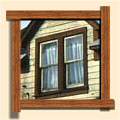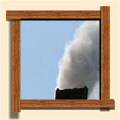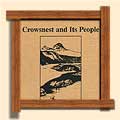


Home>> The Industry>> Mines>> Crowsnest Pass>> Coleman Mine
 |
|
Bellevue Mine
Blairmore, South Coleman |
|
|
by Harold Nelson
 Of the early days of the coke ovens I do not have too much
real information. As far as I know, they were built in 1903 and
1904 to supply coke for the Grandby smelter at Grandby, BC. Originally there were approximately 218 ovens built, in a
line eastward from a point from the present Elk's Hall to the
west bank of Nez Perce Creek at East Coleman, on the south side
of the CPR tracks. Later, another 14 ovens were built on the
south side of these, at the west end.
Of the early days of the coke ovens I do not have too much
real information. As far as I know, they were built in 1903 and
1904 to supply coke for the Grandby smelter at Grandby, BC. Originally there were approximately 218 ovens built, in a
line eastward from a point from the present Elk's Hall to the
west bank of Nez Perce Creek at East Coleman, on the south side
of the CPR tracks. Later, another 14 ovens were built on the
south side of these, at the west end.
 At this time, the ovens were all hand pulled and loaded into
the CPR coke racks. This was done mostly by contract, at so
much per oven and loaded at so much per car. Some time during
World War I, a machine called a Coke-puller was purchased from
the US and it did away with a lot of hand labor.
At this time, the ovens were all hand pulled and loaded into
the CPR coke racks. This was done mostly by contract, at so
much per oven and loaded at so much per car. Some time during
World War I, a machine called a Coke-puller was purchased from
the US and it did away with a lot of hand labor.
At the end of World War I, orders for coke dropped and they closed down at the end of 1918 and remained closed until the fall of 1932. During the early depression years of 1930 and 1931 coal orders dropped. As the CPR orders dropped the mines on the Alberta side of the Crowsnest Pass were only working about two days per week. In the early spring of 1932, the miners went on a strike which lasted all summer.
 In the fall of 1932, the International Coal and Coke Company
got an order for 70,000 tons of coke for the smelter at Trail,
BC. The 14 ovens I previously mentioned were repaired and
samples sent which proved satisfactory.
In the fall of 1932, the International Coal and Coke Company
got an order for 70,000 tons of coke for the smelter at Trail,
BC. The 14 ovens I previously mentioned were repaired and
samples sent which proved satisfactory.
A Herculean task was then encountered to repair and rebuild 104 ovens to take care of this order. With the craftsmanship of such stone masons as Black Joe De Cecco, Primo De Cecco, Frank De Cecco and Joe Sinini and others whose names I have forgotten, the ovens were soon fixed up and in operation. A number of boys were hired at $2.75 a day and they were mostly mason's helpers. They mixed the mortar, cleaned bricks and stone, and cut away the old brick inside the ovens with a hammer and steel. This order gave the mine two extra days' work a week. At this time the mine rate of pay for labor both inside and outside was $4.45 per day.
 Dick Greenhaigh, who was a pit-boss inside, was brought out of
the mine to take charge of the operation. He had been coke oven
foreman when they closed down in 1918 and was actually the only
one around who knew how. He remained in charge till he became
ill in 1942 when I took his place. He later took over again for
a short time in 1949 and then was put in charge of another
operation.
Dick Greenhaigh, who was a pit-boss inside, was brought out of
the mine to take charge of the operation. He had been coke oven
foreman when they closed down in 1918 and was actually the only
one around who knew how. He remained in charge till he became
ill in 1942 when I took his place. He later took over again for
a short time in 1949 and then was put in charge of another
operation.
Once the ovens were in full production, there were about 43
men and boys working there. It was a seven day a week operation,
the men worked three days and one day off, 365 days a year.
This article is extracted from Crowsnest and its People: Millennium Edition (Coleman, Alberta, Crowsnest Pass Historical Society, 2000). The Heritage Community Foundation and the Year of the Coal Miner Consortium would like to thank the authors and the Crowsnest Pass Historical Society for permission to reprint this material.
